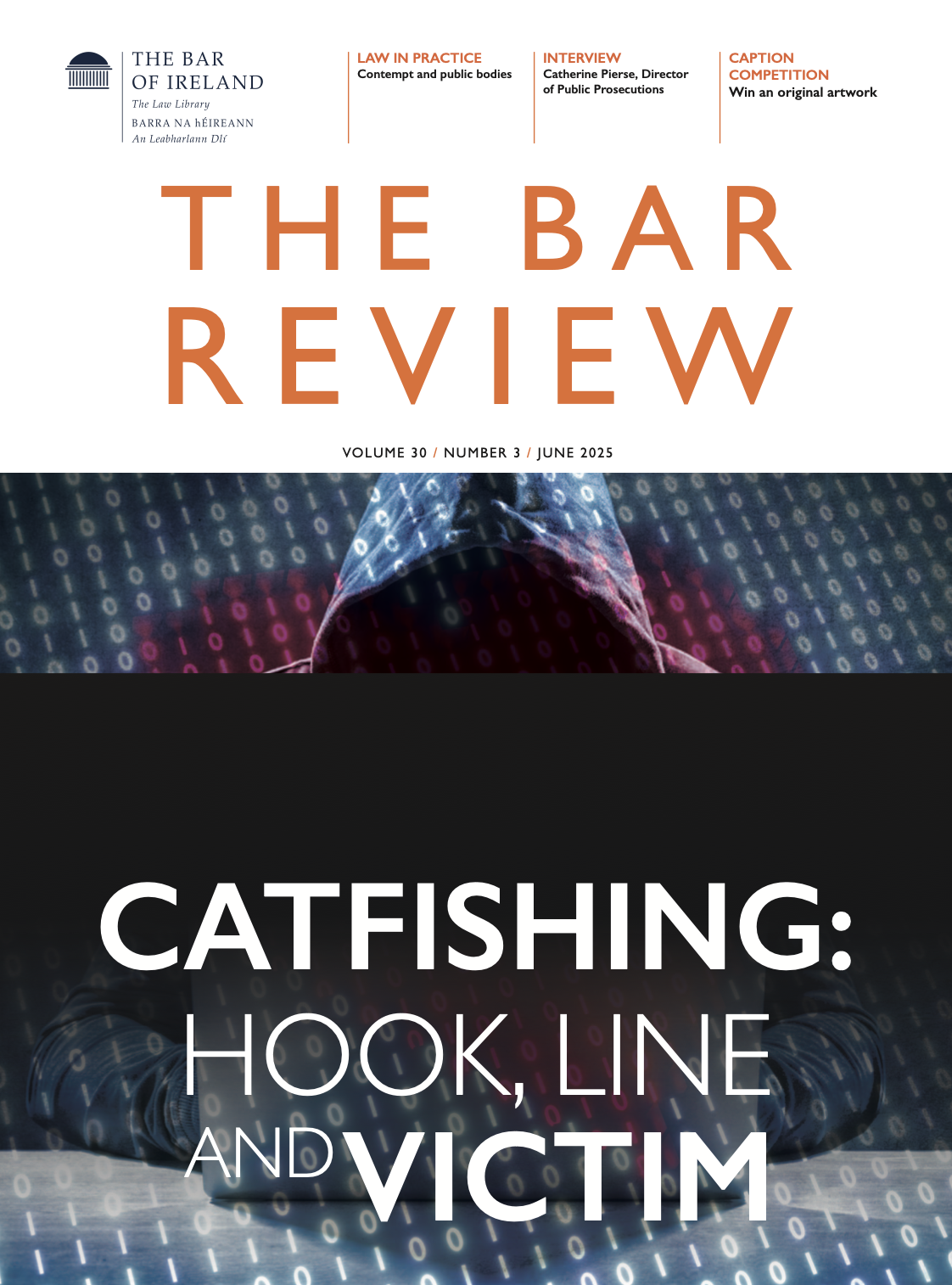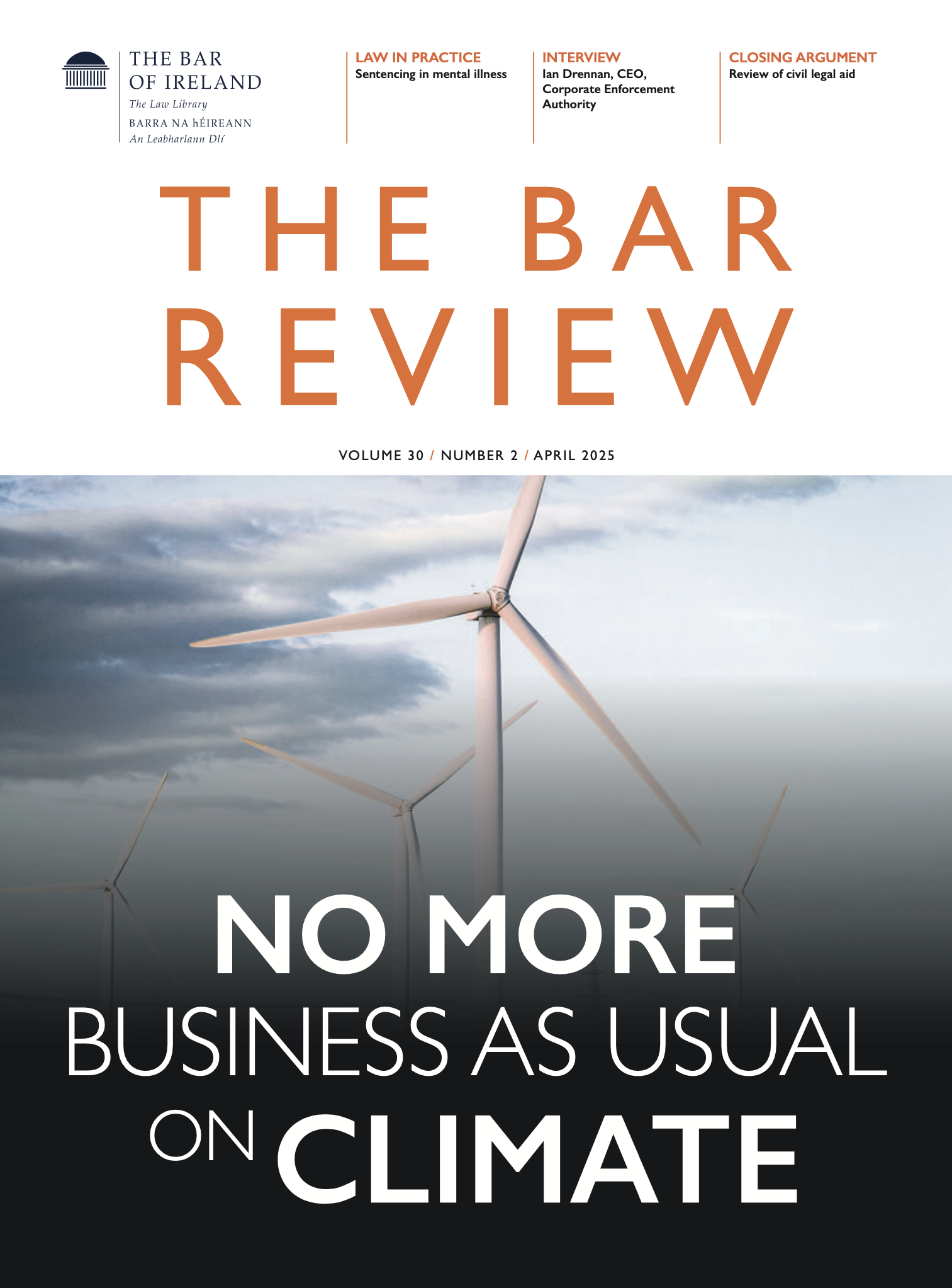Latest legal updates and news from the December issue of The Bar Review include an interview with Ronnie Robins SC, former Father of the Bar, articles on coercive control & stalking, Isaac Wunder orders and administrative tribunals, methods of dramatically increasing judicial capacity and more.
Highlights from December Issue
Father of the Bar

As he retires from the Law Library, Ronnie Robins SC reflects on a career at the Bar that has spanned seven decades, all of them full of fantastic tales.
One of the best known and respected figures in the Law Library, Ronnie Robins SC retired just before the start of this new legal year. Having begun in the early 1960s, Ronnie’s career at the Bar has been over 60 years in the making, but its beginnings were far from the more traditional routes to a career in law.
Ronnie’s career in criminal law was a colourful one, entirely involving defence work, and it came to a suitably colourful end: “I acted for a very clever and successful criminal, a pretty unattractive fascist who had been a political secretary to one of the Mitford sisters. He was, I think, probably one of the serious criminals at that stage, when they were almost becoming professional criminals. He ran out of steam, as so many of them do, and he owed me for a year’s work. When his solicitor, Billy Bradshaw, came to me and said, ‘He’s over in the Bridewell, will you come over?’, I said, ‘He owes me too much’, and I wouldn’t. Billy came back to say that he had a horse. I think, being a Protestant, you feel naked without a horse, so I took the horse. After a while, the criminal, who at this stage had run out of money, sued me for larceny of the horse because we hadn’t got a receipt, hadn’t properly documented it. So that steered me off criminal law”.
Is there anything he won’t miss? “No, there’s nothing. I never found any aspect of it unpleasant. I was lucky. I made great friends and I was lucky enough that I got on, people were always very good to me and I enjoyed it”.
New laws to tackle coercive control and stalking

Eithne Reid O’Doherty BL and Sean Gillane SC examine the new legislation and high-profile cases have raised awareness of the offences of coercive control and stalking in Ireland and other jurisdictions.
Recent high-profile prosecutions in Ireland and England have brought public attention to the offence of coercive control. A new stand-alone offence of stalking is provided for in the Criminal Justice (Miscellaneous Provisions) Bill 2022, which has passed its second stage, and this bill also amends the offence of harassment, which was introduced under section 10 of the Non-Fatal Offences Against the Person Act 1997.
The impetus for legislative change has been the Council of Europe Convention on Preventing and Combatting Violence against Women and Domestic Violence (the Istanbul Convention), which Ireland ratified on March 8, 2019. Articles 5 and 7 of the Convention set out the State’s legislative obligations in respect of the prevention, protection and prosecution of gender-based violence. Article 34 imposes an obligation on contracting states to criminalise stalking.
Isaac Wunder orders and administrative tribunals

Although Isaac Wunder-type orders have no statutory basis in Ireland, extensive case law, and certain Constitutional provisions, have allowed for significant development of the law in this area. Ali Bracken Ziad BL considers.
An Isaac Wunder order is a form of injunctive relief that can be obtained against vexatious litigants engaged in civil litigation. Isaac Wunder orders can come in many different forms; however, in essence they are a species of prohibitory injunction that has developed at common law to protect against the abuse of court processes. In effect, an Isaac Wunder order will restrain a litigant from initiating legal proceedings without the leave of the High Court.
In England and Wales, Isaac Wunder-type orders have been put on a statutory footing, and are described as civil restraint orders. The rules are provided for under Part 3 at Rule 3.11 of the Civil Procedure Rules (CPRs). Practice Direction 3C supplements this rather sparse rule by providing a significant amount of detail on orders of this type. This rule was added to Part 3 of the CPRs by the Civil Procedure (Amendment No.2) Rules 2004 (SI 2004/2072) and came into effect on October 1, 2004. The rule puts the Court’s inherent jurisdiction to prevent abuse of its processes on a statutory footing.
Methods of dramatically increasing judicial capacity

Michael Judge BL examines the issue of judicial capacity both in Ireland and internationally, and other jurisdictions who have applied a variety of approaches to address this, some of which may be applicable here.
Last year, Irvine P. stated that to help clear the backlog of cases and “to make a real difference”, the High Court alone requires 17 new judges.1 The lack of judicial resources intersects with another issue that is presently under review across the common law world: the appropriate age of retirement for judges. In fact, the Association of Judges of Ireland requested that the Department of Justice conduct a review of the retirement age for judges in 2019, to which a public response has not been forthcoming.
This article also considers the UK Supreme Court’s supplementary panel and the role of part-time judges in the UK, but does not consider either to be constitutionally viable options in respect of the superior courts. However, the availability of deputy judges at the District and Circuit Court levels may be a beneficial method of increasing judicial capacity on an ad hoc basis. This article notes that the UK has recently increased its mandatory age of retirement for judges to 75, but considers this bright-line approach to be less ideal in this jurisdiction, in circumstances in which there are constitutional limitations that prevent future full-time judges from developing experience in the same manner in which the future judicial pipeline is developed in the UK.
Download The Bar Review – Volume 27 Issue 5

